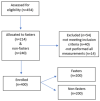Nutrient Intake and Risk Factors for Metabolic Syndrome in Christian Orthodox Church Religious Fasters
- PMID: 37299432
- PMCID: PMC10255146
- DOI: 10.3390/nu15112468
Nutrient Intake and Risk Factors for Metabolic Syndrome in Christian Orthodox Church Religious Fasters
Abstract
Objective: Studies regarding health effects of religious fasting have been increased during the last decade. Our aim was to investigate the impact of adherence to the periodic Christian Orthodox Church (COC) fasting on nutrient intake, body composition, and risk factors for metabolic syndrome (MetS).
Methods: Four-hundred individuals aged 42.6 ± 17.0 years participated in this cross-sectional study. Two-hundred subjects followed the COC fasting since childhood or at least the last twelve consecutive years, and two-hundred subjects did not follow the COC fasting regimes or any other restrictive dietary pattern. Socioeconomic data, lifestyle habits, and physical activity data were collected. Nutritional assessment was performed via two 24 h recalls and a food frequency questionnaire. Anthropometric data and biochemical parameters were also measured.
Results: Fasters had a significantly lower daily intake of calories (1547 vs. 1662 kcals, p = 0.009), protein (52 vs. 59 g, p = 0.001), fat (82 vs. 89 g, p = 0.012), and cholesterol (147 vs. 178 g, p = 0.001) compared with non-fasters. Furthermore, fasters reported a healthier way of living, with lower rates of smoking and alcohol consumption (p < 0.001 and 0.002, respectively). Insulin and magnesium levels were significantly higher, whereas levels of urea, transaminases, glucose, and phosphorus were significantly lower, as was DBP in fasters versus non-fasters. Furthermore, MetS prevalence was non-significantly higher in non-faster compared with fasters.
Conclusion: During a non-fasting period, individuals following the COC fasting recommendations reported lower intake of calories, protein, fat, and cholesterol compared with non-fasters. Fasters tended to have a healthier lifestyle pattern and a lower risk for MetS versus non-fasters. Some biochemical parameters also significantly differed between the two study groups. Further research is warranted to establish the long-term clinical impact of these findings.
Keywords: Christian Orthodox Church fasting; cholesterol; fat; metabolic syndrome; nutrient intake; protein.
Conflict of interest statement
The authors declare that the research was conducted in the absence of any commercial or financial relationships that could be construed as a potential conflict of interest. Emmanouil Dermitzakis is a GSK employee. This work was performed before his appointment at GSK.
Figures
Similar articles
-
The Interplay between Metabolic Syndrome and Religious Fasting in Postmenopausal Women.Nutrients. 2023 May 26;15(11):2478. doi: 10.3390/nu15112478. Nutrients. 2023. PMID: 37299441 Free PMC article.
-
Impact of Christian Orthodox Church Fasting on Metabolic Syndrome Components in Adults Aged 18-49 Years.Nutrients. 2023 Apr 4;15(7):1755. doi: 10.3390/nu15071755. Nutrients. 2023. PMID: 37049597 Free PMC article.
-
Does Religious Fasting Have a Protective Role against Metabolic Syndrome in Individuals Aged >50 Years?Nutrients. 2023 Jul 20;15(14):3215. doi: 10.3390/nu15143215. Nutrients. 2023. PMID: 37513633 Free PMC article.
-
Impact of Christian Orthodox Church dietary recommendations on metabolic syndrome risk factors: a scoping review.Nutr Res Rev. 2022 Dec;35(2):221-235. doi: 10.1017/S0954422421000184. Epub 2021 Jun 10. Nutr Res Rev. 2022. PMID: 34108056
-
A critical review of current evidence, perspectives and research implications of diet-related traditions of the Eastern Christian Orthodox Church on dietary intakes and health consequences.Int J Food Sci Nutr. 2010 Nov;61(7):739-58. doi: 10.3109/09637481003769782. Int J Food Sci Nutr. 2010. PMID: 20459365 Review.
Cited by
-
Consumption of Ultra-Processed Food and Drink Products in a Greek Christian Orthodox Church Fasting Population.Nutrients. 2023 Nov 24;15(23):4907. doi: 10.3390/nu15234907. Nutrients. 2023. PMID: 38068765 Free PMC article.
-
Association of Christian Orthodox Fasting with Sociodemographic, Anthropometric and Lifestyle Factors and Serum Biochemical Indices: A Cross-Sectional Study on Patients with Metabolic Diseases.Metabolites. 2024 Jan 19;14(1):67. doi: 10.3390/metabo14010067. Metabolites. 2024. PMID: 38276302 Free PMC article.
-
Nutrient Intakes in Vegans, Lacto-Ovo-Vegetarians, Orthodox Fasters, and Omnivores in Russia: A Cross-Sectional Study.Foods. 2025 Mar 20;14(6):1062. doi: 10.3390/foods14061062. Foods. 2025. PMID: 40232088 Free PMC article.
-
Special Issue "Sustainable Nutrition-Healthy People".Nutrients. 2023 Jul 19;15(14):3199. doi: 10.3390/nu15143199. Nutrients. 2023. PMID: 37513617 Free PMC article.
-
Association between Dietary Patterns and Metabolic Syndrome Risk Factors: A Cross-Sectional Study of Christian Orthodox Church Fasters and Non-Fasters in Greece.Foods. 2023 Sep 19;12(18):3488. doi: 10.3390/foods12183488. Foods. 2023. PMID: 37761196 Free PMC article.
References
-
- Smith R. Let food be thy medicine…. BMJ. 2004;328:7433. doi: 10.1136/bmj.328.7433.0-g. - DOI
MeSH terms
LinkOut - more resources
Full Text Sources
Medical


